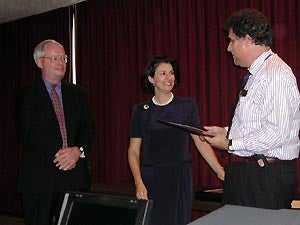Task force seeks to curb alcohol abuse
(Sept. 4, 2001) — A university-wide coalition is trying to develop strategies to curb student alcohol and drug abuse at ECU.
“We’re not looking for zero tolerance,” said Dr. Brian McMillen, professor of pharmacology and one of the co-chairs of the Task Force on Reducing the Impact of Alcohol and Drugs at ECU. “We’re looking for better health and self-respect for students.”

ECU professor Dr. Brian McMillen (right) receives a C.A.M.P.U.S. award for a statewide program to reduce college drinking from Dr. Jacob Lohr of the Governor’s Institute on Alcohol and Substance Abuse, and from NC’s First Lady Mary Easley.
McMillen, who discussed the task force and its work at the Faculty Senate meeting on Sept. 4, said it is important for his colleagues to understand that “for every 15 freshmen who drink their way out of ECU, we lose one faculty position.”
The task force, co-chaired by Dr. Phebe Kerr, associate vice chancellor for student success, was established last January. It was among 10 North Carolina university organizations receiving grants last week from the Governor’s Institute on Alcohol and Substance Abuse. Kerr said the $8,000 grant will be used to develop plans to eliminate the mixed messages about alcohol and drugs created by incongruent policies and enforcement and to identify and reduce enabling behaviors on campus.
The central focus of the coalition, Kerr said, is “to assess the social and academic environment of our university to see where it may be inadvertently supporting the misuse of alcohol and other drugs.”
The extent of the drinking and substance abuse problem among ECU students is documented by the CORE survey, a national assessment given every two years.
The new university coalition has members from many segments of the campus: key student leaders, academic affairs staff members, faculty, student life representatives, athletics, parents and alumni.
McMillen, who has been studying alcohol and drug addiction for years, said, “If we’re going to accomplish anything, we have to get all parts of the ECU community to buy into it.”
Both he and Kerr described the task force’s work as long-term. “We’re trying to change the whole environment. That’s a multi-year process,” Kerr said.
“It’s like plowing the beach at low tide,” McMillen said.
McMillen said examples of mixed messages about the use of alcohol on campus could be seen in the tailgate parties that precede home football games and in the announcements that were sent to faculty and staff members promising music and beer at Freeboot Friday events.
Kerr cited factors such as relatively few classes being scheduled on Fridays or classes being canceled after Halloween as possible enabling mechanisms for abusive drinking.
McMillen said a variety of approaches to curbing drug and alcohol abuse have been tried on other campuses, with varying degrees of success. What ECU envisions, he said, is an environmental approach.
“We have to sell the concept that it is possible to have fun in college without getting throwing-up drunk every weekend,” he said.
Throughout American history, alcohol and substance abuse have waxed and waned, and they go up and down in response to decreases and increases in social pressure, McMillen said.
“We have to build social pressure (against abuse) and keep it up,” he said. “We have to market social pressure.”
Another aspect of the problem on campus, he said, is that “we are trying to change behaviors that were initiated before the students got here.” Many students begin binge drinking in high school, he said.
Kerr said that the university already has a number of initiatives under way. “We do a lot of programming in the residence halls and Mendenhall Student Center that are non-alcohol alternatives,”
Contact: ECU News Bureau | 252-328-6481